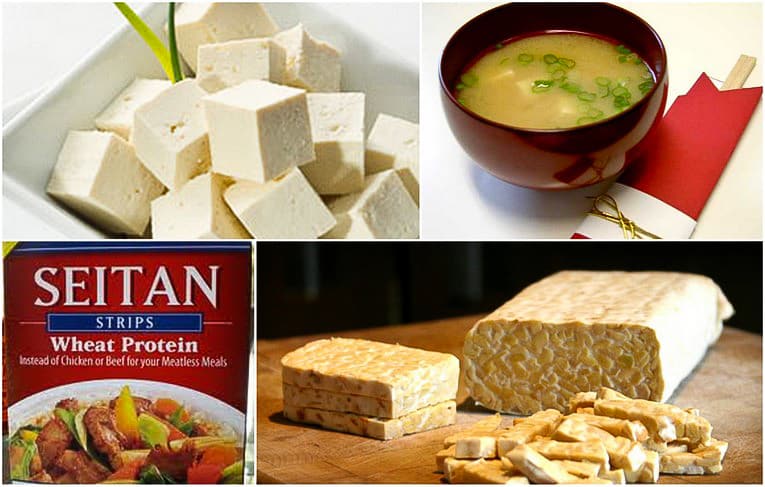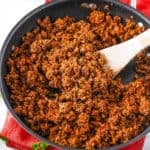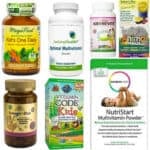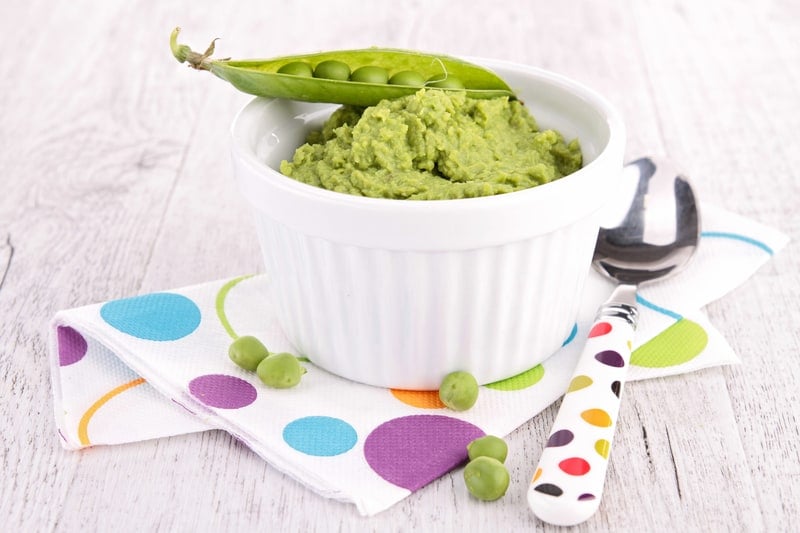The Truth About Fake Meat & Protein Bars (or: Should You Eat Soy Protein?)
This post may contain affiliate links. As an Amazon Associate, I earn from qualifying purchases. Please read my disclosure.
A few weeks ago, I was chatting with the husband about protein bars.
Since he (and I) are vegetarian and since we are both super active, I’m always looking for healthy, veggie-friendly protein. Unfortunately, with all of the fake-meat-soy-products and soy-based protein bars out there – that’s often hard to come by.
This is because soy protein isolate has been used as a high protein source in many veggie-friendly products – which I tend to avoid eating (more on that later).
I was explaining all of this to the husband, and he pointed out that the information out there on soy in general is super confusing, as is knowing what types of nutrition bars or veggie-friendly protein products are healthy to eat.
And he’s right! I was confused about soy protein for the longest time (half the articles out there tout it as a superfood, and half of them vehemently disagree with eating soy), and it was only after I did lots of reading and research that I was able to come to a few conclusions of my own.
So here it is …
The Picky Eater’s Guide to Soy: What to Eat and What Not to Eat!
First, let’s look at unprocessed soy products like tofu, tempeh, miso, etc. as well as non-soy protein that people sometimes confuse as soy (seitan).

What are these products?
- Edamame are whole “young” soy beans – they are picked before the bean has hardened so you can eat them right from the pod.
- Tofu is made from whole soy beans. It is the bean curd that is mashed into blocks (after coagulating soy milk).
- Tempeh is made from fermented whole soy beans. The fermentation process binds the soy beans into a cake form.
- Miso is a thick paste made from fermented soybeans and barley or rice malt. It is used in Japanese cooking to make soups or sauces.
- Soy Milk is produced by soaking dry soy beans and grinding them up with water.
- Seitan isn’t soy at all! It’s actually a wheat protein made from wheat gluten.
Should you eat them? (you’ll see a theme here 🙂 )
- Edamame: Eat only if it’s 100% organic and non-GMO
- Tofu: Eat only if it’s 100% organic and non-GMO
- Tempeh: Eat only if it’s 100% organic and non-GMO
- Miso: Eat only if it’s 100% organic and non-GMO
- Soy Milk: Eat only if it’s 100% organic, non-GMO, and if the only two ingredients on the label are Whole Organic Soy Beans and Water
- Seitan: If it’s organic, 100% natural (no chemicals or other ingredients you can’t pronounce), and if you can tolerate gluten – it is fine to eat.
Why is it important to only eat organic soy?
Because over 90% of the soy in this country is genetically modified (GMO), unless it is organic. That means it’s more chemically altered, sprayed with toxic pesticides, and more processed compared to its organic relative.
The Bottom Line: Out of all of the unprocessed, whole soy products above – I’d recommend sticking to the fermented versions like tempeh and miso and enjoying the other soy products in moderation (more on why in the question below). And always choose 100% organic, non-GMO for any soy products you buy!
***
Now – onto the second question: What’s with the whole estrogenic-properties-of-soy thing?
Soy contains phytochemicals called isoflavones (aka phytoestrogens). Phytoestrogens are natural plant hormones that mimic estrogen in our bodies. For some people, these estrogens may help balance their hormones, but they can also throw off the hormonal balance for other people. The jury is still out on whether phytoestrogens are beneficial or “superfood-like.”
Eating soy is NOT the same as taking estrogen by any means. But some people are more sensitive to phytoestrogens than others — which is why I try to only eat whole soy products in moderation (not more than once or twice a week max). And I probably wouldn’t use soy-based forumla for babies because who knows how those phytoestrogens affect little ones.
BUT fermented sources of soy (like miso, tempeh, and natto) are actually better than non-fermented sources. Fermentation increases the digestibility of soy, adds good bacteria, and reduces the plant estrogen content in soy foods.
Side note: People with low thyroid functioning need to limit their soy consumption since soy contains substances called goitrogens which can slow the production and/or release of thyroid hormones in the body.
The Bottom Line: Eat soy in moderation and choose fermented when possible!
***
Lastly – the big question: What’s the deal with soy protein isolate and all of the veggie-friendly protein bars/products?
If you take a look at the nutrition label of most protein bars, veggie burgers, or fake-meat products, you’ll see soy protein isolate featured as one of the main ingredients.

So what is soy protein isolate?
Soy protein isolate (SPI) is basically the isolated protein component from the soy bean. Creating SPI requires a heavily chemically engineered process to “isolate” that protein: the end result of which is a denatured protein that is stripped of all the nutrients (fiber, minerals, complex carbs) that the original bean contained.
Additionally, to isolate the soy protein, the soy beans are soaked and sprayed with chemicals like aluminum and hexane – which often leaves behind residue that you don’t want to be eating. Hexane is a neurotoxic petrochemical solvent that is listed as a hazardous air pollutant with the Environmental Protection Agency (EPA). The spray-drying method used for soy can also form nitrites – compounds that can form carcinogens in the body.
And if that’s not enough, SPI is always GMO and filled with pesticides.
Lastly, SPI has a higher concentration of trypsin inhibitors – which are chemicals that reduce trypsin (an enzyme that helps digest protein) in the body.
So SPI may have started out as a plant, but once it gets to you, it’s far from it. The products that use SPI also have the craziest list of ingredients and are super processed themselves (methylcellulose or disodium inosinate anyone?) – which is another reason to stay away from those products altogether. Remember if you can’t pronounce it, you probably don’t want to be eating it.
Some tips about SPI – it can be “hidden” under other names like:
- textured vegetable protein (TVP)
- soy protein concentrate
- Soya, Soja or Yuba,
- textured soy flour (TSF)
- textured soy protein (TSP)
The Bottom Line: NEVER eat products containing soy protein isolate or any “terms” related to soy protein isolate in the list above. Read your ingredient lists carefully and stay away from products with long ingredient lists you can’t pronounce!
This can be hard because lots of popular brands: Clif Bars, LUNA Bars, MorningStar, etc. have SPI on their ingredients list. But there are many other products out there that don’t! You just have to be a little more diligent and read the labels (health food stores and Whole Foods definitely have other options).
***
The Bottom Bottom Line: What to do if you’re vegetarian or want non-meat-protein sources?
#1 | Stick to natural, whole protein sources like beans, eggs, cottage cheese, Greek Yogurt, lentils, nuts, seeds and organic, non-GMO natural sources of soy like edamame, tempeh and tofu (free of sugar, artificial sweeteners, or other additives)
#2 | Try making veggie burgers at home or buy frozen veggie burgers that don’t have SPI like this kind from Amy’s
#3 | Stick to protein-bar brands that don’t use Soy Protein Isolate like Zing , LaraBar UBER, and CORE Foods. KIND is a good option as well, but read the labels carefully – some of their bars do have soy protein isolate in them! The KIND bars that don’t are a tasty and healthy snack.
#4 | If you like protein powder – try Amazing Meal or SunWarrior
That’s basically it!
In general shopping for healthy packaged food can be a challenge, but remember it’s all about reading the ingredients and knowing which ones to avoid. I hope this post helps you navigate the world of soy!




































Excellent blog about risks of soy isolates. As a health coach, I am often asked about the use of fake meats. I advise my clients to avoid processed foods, especially since most contain some soy derivative, usually GMO. Lots of people live on soy versions of burgers, chicken nuggets, and ribs. I am sharing your blog with my clients and including a link in my blog!
Thank you so much Beth!! I’m totally with you — so many people live on soy burgers/fake meat and it’s really important to know what goes into making those products! Thanks again for sharing my post and helping to spread the word 🙂
Wow super comprehensive look at this. Some great facts you’ve presented, and definitely quite a few things to consider. Thanks for your time in putting this together 🙂
No problem at all Larry!! I really just wanted to make this topic as easy to understand and comprehensive as possible. Thanks again for your kind words!
Hi Anjali! Such a great article! I’m definitely introducing it to my community today! Thank you for taking the time to put together such comprehensive information on such a complicated topic!
Yay!! Thanks for sharing this post with your community Teresa!! I’m so glad you found this helpful!
Much better if we it soybeans rather than to eat soy protein bars because we can’t assure, whether it is a fake or legit.. Well, good information Anjali. This is actually my first time to visit and read your blog post and I find it really useful
Thank you for the kind words Will!! I’m so happy you found this post (and my blog) useful. And yes, absolutely – whole organic soybeans are much much better to eat than soy protein bars/shakes/processed foods.
Great article, Anjali! Thank you for all the details. You must have put in a lot of research into this. Looking forward to reading more.
Thank you so much!! And yes – absolutely did a ton of research before writing this post – I wanted it to be as comprehensive and accurate as possible 🙂 Thanks again!
This is great! I’ve been wondering about all the conflicting news I’ve been hearing about soy. Thank you for the awesome information! I am now well informed to make good decisions about eating soy. 🙂
So happy to hear that Crystal!! That was my goal in writing this post – to get through all of the conflicting information and figure out what the research said 🙂
Anjali,
THanks for sharing this very informative piece about the soy family. I’ve been suffering from an allergy/autoimmune disorder fora few months now and have been on an elimination diet.
Hi Anjana! No problem at all – so glad it was helpful. An elimination diet is one of the best ways to diagnose an allergy. I wish you all the best and I hope you are able to figure out your disorder soon! Let me know if I can help in any way – sending healthy well wishes your way 🙂
Thank you for all the info and the recipe. I cannot eat any soy due to the fact I have hypothyroidism and it effects it in the wrong way.
That makes complete sense Betty – soy contains substances called goitrogens which can slow the production and/or release of thyroid hormones in the body, so if you have hypothyroidism you should definitely avoid it!
Hi Anjali,
Thank you for your so details knowledgeble about tofu nutrition. I like to eat a lot of tofu. Next time I know what kind of tofu I should buy. Thanks for your hard work. Thank you for answer my last question.You are a really warm person. I like your working attitude.
Aw thank you so much for your kind words!! I’m so glad this post was helpful – and no problem at all – I’m more than happy to answer any other questions you might have in the future as well!
I agree 100%. When I was going through menopause, I had a horrible time with heavy bleeding and did some reading and immediately cut out ANYTHING that mimicked estrogen. Noticed a difference almost immediately and managed to get through w/o hormone therapy, etc. I love quinoa which has a really good amount of protein. I won’t use TVP at all, but bulgur makes a wonderful veggie chile–it looks just like hamburger, too. Bottom line for me, the more processed anything is, the less I want to use it. Just ’cause it says “vegetarian” doesn’t mean it’s necessarily healthy. Keep reading those labels!
Completely agree GG! Oftentimes things are marked as “vegetarian” or “vegan” to imply that they’re healthy but they’re actually not! I read ingredient labels with so much scrutiny just to make sure I really know what I’m eating. Thanks for sharing your story and your tips! Love the idea of using bulgur to bulk up veggie dishes!
This is great, thanks!
Thanks Natalia!
So do you think plain TVP is not very healthy? I use it occasionally with soy sauce to make a mock ground beef, but my world won’t be shattered if it turns out to not be the healthiest thing in the world. 😉
Hi Tom! I’m so sorry but TVP is basically soy protein isolate under a different name. :/ I’d recommend trying tempeh or super firm tofu crumbles instead – those should work well if you combine it with soy sauce and a bunch of other spices to mimic ground beef! Hope that helps!
I was wondering if you could tell me if a product from India, Nutrela high protein soya chunks made by Ruchi is safe product for vegetarian (or anyone) to eat. Is there a way to find out if this product is non-GMO? I’m pretty sure it’s not organic. Thanks for your help with this.
i now remember that i brought nutrela long back from an Indian store and just used it one time being skeptical about it :-))…
Hi Nancy! I’ve never used Nutrela Soya Chunks, and unfortunately I couldn’t find an ingredients list or any information on whether it’s GMO anywhere online. But just judging by the fact that there is “Soya” in the title, and “Soya” is another name for Soy Protein Isolate, I wouldn’t recommend it. Instead, I’d recommend taking one of Amy’s veggie burgers (https://www.amys.com/products/product-categories/veggie-burgers) and crumbling them up to imitate the soy protein chunks/crumbles!
awesome post…what a coincidence….i and my husband have been talking about the same topic yesterday….ur post is exactly what we were looking for…thanks anjali….i love soy milk…with all the myths around soy..we reduced its consumption and taking it moderately these days, we usually buy organic soy milk, tofu, tempeh from Trader Joe’s though its organic i see some scary ingredients like carrageenan(heard its not good), salt added to it. but my question is i never came across soy milk with just 2 ingredients like u suggested……where do u buy such milk?Do u make it at home?
also can u please recommend best protein powder for vegetarians and also where to buy them?
i tried raw garden of life..its good but little chalky to taste….thanks a ton for the valuable info.
Thanks Jo!! I’m so happy this was helpful to you! So yes! You can find organic soy milk with only two ingredients. WestSoy has a wonderful soy milk — I think they sell it both at Whole Foods and at Trader Joe’s. It doesn’t have carrageenan in it either (which I also try to avoid). My favorite protein powders are Amazing Meal and SunWarrior (linked in the post above). I’d recommend blending them with a bit of almond butter, almond milk or soy milk or regular milk, berries, and even a little greens if you’re feeling adventurous! Hope that helps!
Hi Anjali, I am a new reader of your blog. First and foremost, I can’t believe you are only in your twenties but already so knowledgeable about nutrition and healthy eating! I have just begun my quest for healthy eating and this post have given me a guide on what food I should look out for the next time I head to a supermarket. Thanks for sharing!
Thanks so much for your kind words Candice!! I’m so glad this post is helping you on your path to healthier eating 🙂 Let me know if you have any questions along the way, happy to help in any way I can!
Very interesting read!
I actually had a spaghetti squash singapore noodles with tofu for lunch!! uh oh!
Thanks for the info! Easy to read and informative!
Thanks Olga!! Oh and btw — tofu is totally fine in moderation – just try to get Organic / non-GMO if you can!! So no need for an uh-oh moment there 🙂 So glad this post was helpful!
You rock my world! Thank you for this! I’ve been telling Rupen for years that the veggie meat (Morningstar crumbles…) doesn’t agree with me — and I was guessing it because of the color and high sodium! Now I have your article to show him!!!
Awwww thanks Komi!!! You know I had the same problems with veggie meat — that it didn’t agree with me as well — which is what started my search for answers actually 🙂 I’m sure the artificial additives and sodium don’t help, but it’s probably mostly because of the soy protein isolate. You’ll have to tell me what Rupen says when you show him this post! 🙂
This is one of the best articles I’ve read on Soy. Informative, clear, and helpful. Sincere thanks!
Hooray!! Thanks Pooja – so happy to hear that!!
Thank you for this post. I’ve been moving our family to a mostly vegetarian diet – fish sometimes during dinner and occassionally chicken. Your blog has helped me find new recipes that my family enjoys instead of whining about eating healthy. I recently picked up edamame and tofu but haven’t cooked them yet. I have seen a lot of people buy TVP and I’ve almost picked that up, assuming that it was a great meat substitute. I’m glad I follow your blog.
Hi Jeannie! Aw yay! I’m so glad my blog has helped you to eat more healthy vegetarian meals! That’s wonderful 🙂 And I’m really happy this post was helpful to you as well!
This was very thorough – Thanks.
No problem at all! Glad it was helpful!